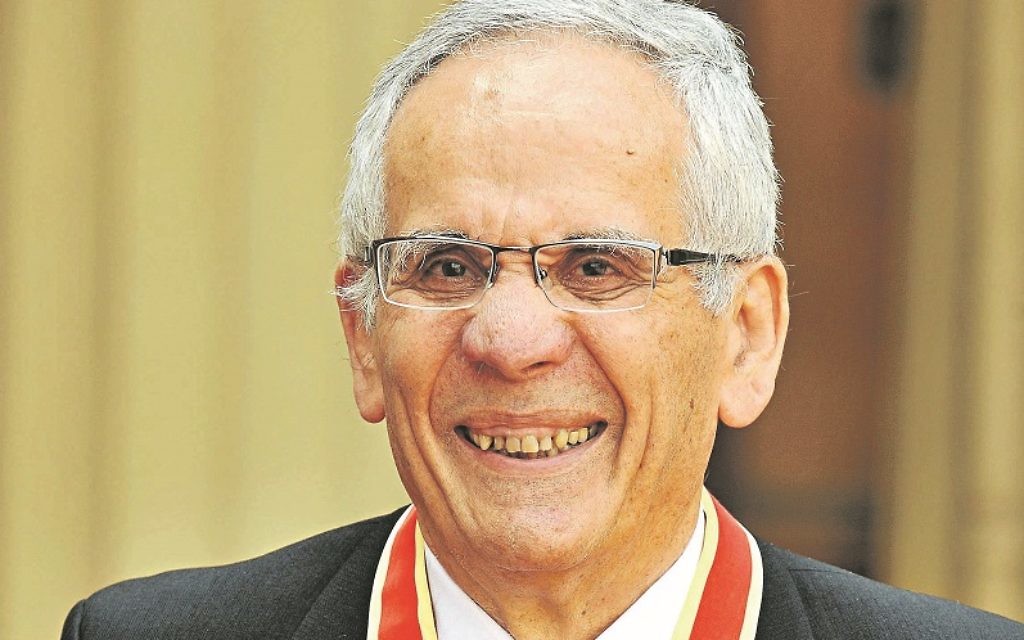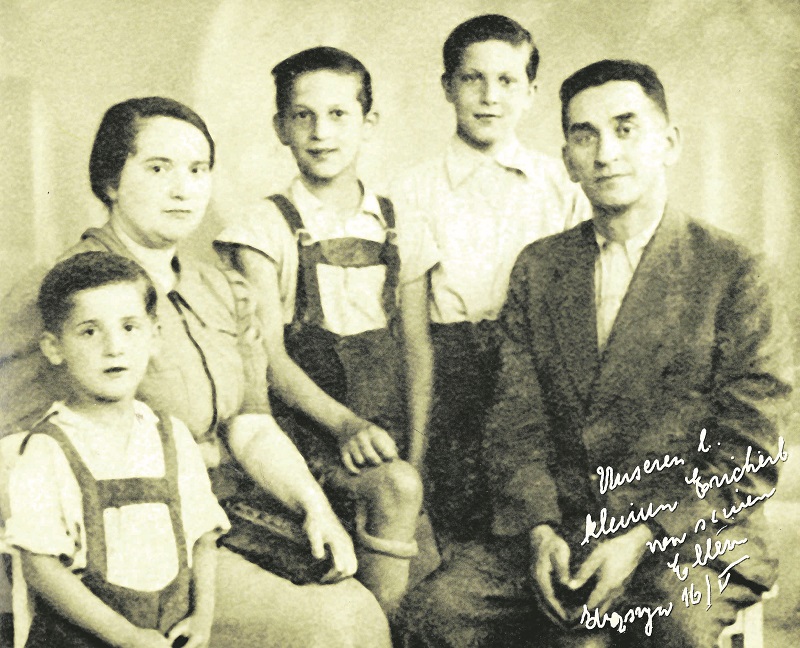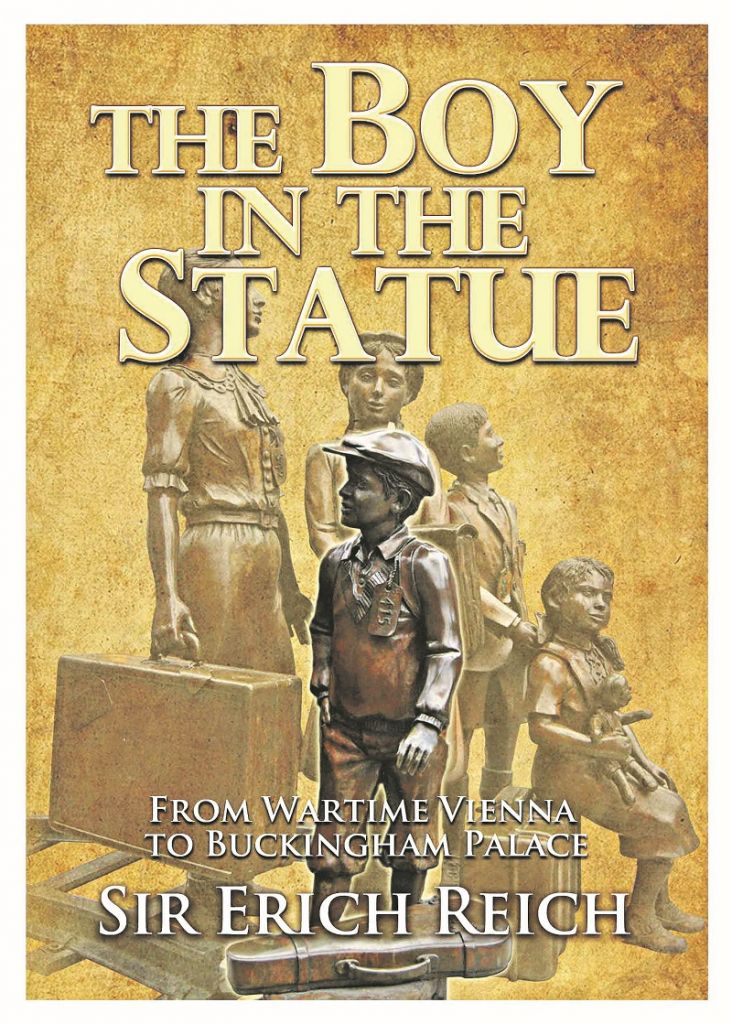Sir Erich Reich: ‘I belonged nowhere, but everywhere at the same time’
The entrepreneur-turned-philanthropist details his life as a Kindertransport orphan in his new memoirs, The Boy In The Statue
Aged just four, Sir Erich Reich joined the Kindertransport and waved goodbye to his parents, little knowing he would never see them again – or indeed have any lasting memories of who they were.
Sir Erich, who was born in Vienna in 1935, details his incredible life story from entrepreneur to philanthropist in The Boy In The Statue: From Wartime Vienna To Buckingham Palace.
In his autobiography, Reich, who serves as chair of The Kindertransport, a special interest group of the Association of Jewish Refugees, describes how he and his two brothers left the Austrian capital to the safety of England.
Get The Jewish News Daily Edition by email and never miss our top stories Free Sign Up
He was the youngest son of Schapse and Mina Reich, who had 20 years earlier, separately fled violent anti-Semitic pogroms in Poland for a better life in Vienna.
Following the Anschluss in 1938 and the expulsion of Polish Jews from Austria to the Polish border town of Zbaszyn, where they were stuck in no-man’s land for nearly a year, his parents made the difficult decision to hand over their three boys to strangers for safekeeping.
Jacques, aged 11, came in June 1939, while Ossie, 10, and Erich, four, travelled together two months later aboard a boat called the Warszawa, before arriving in London.
Reich’s earliest memories are of Burchett House, a refugee hostel in the commuter town of Dorking where he was sent.
Ossie, who was of school age, was almost immediately evacuated from the Jewish Free School in London to Ely in Cambridgeshire with Jacques, who had first been sent to the south coast.
Reich, now 82 and living in Highgate, was soon fostered by Emilie and Joseph Kreibich, whom he credits with giving him a “sense of belonging”.
The Kreibichs, Christian socialists from Sudetenland, the German-speaking part of Czechoslovakia, had also fled the Nazis.
“It’s very important to stress that for parents to let their children go [on the Kindertransport] was critical, and that I was very well looked after by a refugee couple who already had grandchildren,” he explains.
The father-of-five describes Emilie as the “Yiddische Mama, who wasn’t” because, he says: “She treated me as her son – she was fantastic. My foster father, a carpenter, was quite stern, although I had a very good relationship with him.”
Joseph died when Reich was 11 – a heavy blow – and there was pressure for him to now get a Jewish education. However, he often felt “in limbo, not belonging anywhere, but being part of everywhere at the same time”.
After the war, Reich moved to London and to Hasmonean School – where he lasted just three months – before making aliyah aged 13 to live with his aunt and uncle, who were settled in Israel.
The following year, he lived in a very left-wing kibbutz until he was 18.
After serving in the Israeli army, he moved back to England, later returning to the state before coming back again to England.
Through all this, Reich became a chameleon; he was no longer fearful of new adventures.
“I was born in Vienna, sent to Poland, I went to England, to Israel, I came back, so I’ve been all over the place, all within 10 to 12 years.
“I had to learn several languages, had two different religions, different ways of life, so in a way it must have had an effect on me.
“The various changes that happened to me made me think more laterally. They made me feel that I could get on with anybody,” he explains.
The young Reich is immortalised in Frank Meisler’s monument, Kindertansport – The Arrival, at Liverpool Street Station, from which the title of his book is derived.
“When Frank was designing the statue, he rang me and said would I send him a picture of me when
I was about five. I did, and asked him if it was ok. He said: “Yes, but how do you make a mensch out of a hooligan?!’”
He feels he coped by moving on from the experiences of his younger years. “By and large I look forwards rather than backwards. There’s no point – things have happened, you can’t change them, the only way is to get on with life however you can.”
However, he acknowledges that it must have been so much harder for older children coming on the Kindertransport.
“There are people who, because they remember their parents and their way of life, find it much more difficult than I do. I can’t remember my parents, I can’t remember anything about what happened – I’ve blocked it out and that may be because I was so young or because of my genetics generally.”
There are certainly melancholic themes in Reich’s book – it must have been unbearably difficult growing up without his parents and having to renew the bonds between his brothers after several years of living apart.
After arriving in England, Reich only saw Jacques again when he was 10.
He started afresh in Israel with his aunt and uncle, had to adapt to life on kibbutz, moved to and from England, lost his brother Ossie to cancer when he didn’t know he was seriously ill, and divorced three times, which had implications for contact with his children.
However, Reich’s book is also full of self-depreciating humour. He jokes about choosing to support Arsenal rather than Chelsea after being sneaked into Stamford Bridge without paying and laughs at his teenage English naivety when confronted with young women on his kibbutz showering in front of him, to mention just two instances.
After various jobs, Reich became operations director for Thomson Holidays and then with Thomas Cook, organising themed trips to places including India and Egypt.
He eventually set up his own company, Classic Tours, after being made redundant aged 52.
It was after this that Reich, who is now happily married to Glasgow-born Linda, began organising the first of many fundraising bike and other challenges in Israel, which, he says “changed his life and those of many others”.
The first, from Dan to Beersheva, was for Ravenswood and has just marked its 25th anniversary. He has also since helped more than 300 charities raise around £90million.
The 230 cyclists on the first ride were made up of two groups, one supporting Ravenswood in the UK and the other, Edinburgh Medical Missionary Society (EMMS), fundraising for a Christian Arab hospital in Nazareth.
Reich was knighted by Prince Charles in 2010 for services to charity and to the Kindertransport, an honour he had initially thought about refusing.
He tells me: “I did things at the time because that’s what I thought I had to do. But you know, there are a lot of people who worked with me, so I felt like it was only right I accept. I felt some pride, but life just goes on.”
The Boy in the Statue: From Wartime Vienna To Buckingham Palace by Sir Erich Reich is published by i2i Publishing, priced £9.98. Available now.

Thank you for helping to make Jewish News the leading source of news and opinion for the UK Jewish community. Today we're asking for your invaluable help to continue putting our community first in everything we do.
For as little as £5 a month you can help sustain the vital work we do in celebrating and standing up for Jewish life in Britain.
Jewish News holds our community together and keeps us connected. Like a synagogue, it’s where people turn to feel part of something bigger. It also proudly shows the rest of Britain the vibrancy and rich culture of modern Jewish life.
You can make a quick and easy one-off or monthly contribution of £5, £10, £20 or any other sum you’re comfortable with.
100% of your donation will help us continue celebrating our community, in all its dynamic diversity...
Engaging
Being a community platform means so much more than producing a newspaper and website. One of our proudest roles is media partnering with our invaluable charities to amplify the outstanding work they do to help us all.
Celebrating
There’s no shortage of oys in the world but Jewish News takes every opportunity to celebrate the joys too, through projects like Night of Heroes, 40 Under 40 and other compelling countdowns that make the community kvell with pride.
Pioneering
In the first collaboration between media outlets from different faiths, Jewish News worked with British Muslim TV and Church Times to produce a list of young activists leading the way on interfaith understanding.
Campaigning
Royal Mail issued a stamp honouring Holocaust hero Sir Nicholas Winton after a Jewish News campaign attracted more than 100,000 backers. Jewish Newsalso produces special editions of the paper highlighting pressing issues including mental health and Holocaust remembrance.
Easy access
In an age when news is readily accessible, Jewish News provides high-quality content free online and offline, removing any financial barriers to connecting people.
Voice of our community to wider society
The Jewish News team regularly appears on TV, radio and on the pages of the national press to comment on stories about the Jewish community. Easy access to the paper on the streets of London also means Jewish News provides an invaluable window into the community for the country at large.
We hope you agree all this is worth preserving.
-
By Brigit Grant
-
By Laurent Vaughan - Senior Associate (Bishop & Sewell Solicitors)
-
By Laurent Vaughan - Senior Associate (Bishop & Sewell Solicitors)
-
By Laurent Vaughan - Senior Associate (Bishop & Sewell Solicitors)
-
By Laurent Vaughan - Senior Associate (Bishop & Sewell Solicitors)
























